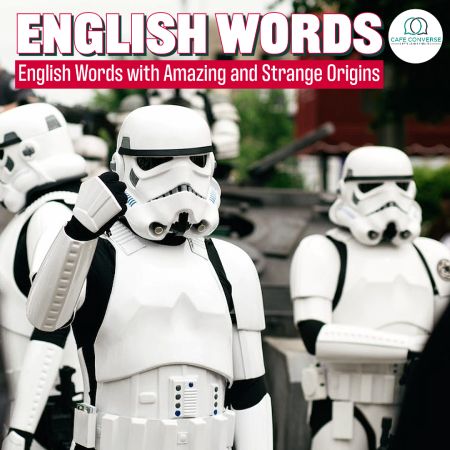Learning a new language is always exciting. It’s a journey that allows us to unravel the intricate threads of linguistic evolution, tracing words back through time to their origins. Consider, English, a language that has borrowed, assimilated, and evolved over centuries, absorbing influences from Latin, French, Germanic tongues, and more. Each word carries a lineage, a narrative etched into the lexicon by the ebb and flow of historical currents.
What are some of the amazing English words that have strange origins?
Let us unravel the mystery of 7 English words with the help of Cafe Converse (One of the leading online English coaching institutes in Delhi), further in this blog.
1. Sandwich
Did you know your beloved breakfast staple, the sandwich has an interesting story behind its name?
It is named after John Montagu, the 4th Earl of Sandwich, a town in the county of Kent, England. The story goes that the Earl was an avid gambler, and he didn’t want to leave the gaming table to have a meal. Instead, he ordered his meat to be placed between two slices of bread so that he could continue playing without using utensils or getting greasy fingers.
2. Robot
The term “robot” originates from Karel Čapek’s 1920 play, “Rossum’s Universal Robots.” Coined from the Czech word “robota,” meaning “forced labor,” it describes artificially crafted beings in the play designed for menial tasks. This unexpected origin highlights the unforeseen evolution of the term, initially tied to automated labor in fiction, now embodying a wide range of automated machines in reality.
3. Ketchup
Ketchup, a British and American staple, originated in 17th-century China as a fish and spice sauce known as kôe-chiap. British explorers encountered it in 18th-century Singapore and Malaysia, where it was called “kecap.” The word “ketchup” likely comes from the Amoy dialect’s ke-tsiap, meaning “brine of pickled fish.” It evolved in Britain and the Netherlands, dropping the fish and incorporating sugar for preservation, eventually becoming the tomato ketchup we know today.
4. Nice
The word “nice” originally didn’t mean so nice—did you know that? Its roots trace back to the Latin “nescius,” meaning “ignorant” or “unaware.” Borrowed into Old French as “nice,” it initially described someone as simple or foolish. By the 14th century, Middle English transformed it to signify someone pleasant or kind, eventually evolving to connote something “pleasant and agreeable,” diverging from its original negative connotation.
5. Nightmare
The term “nightmare” originates from the Middle English “mare,” denoting an evil spirit or goblin in Germanic folklore. This malevolent being was thought to sit on sleepers’ chests, causing suffocation and frightening dreams. The Germanic word “marōn” influenced similar terms across Scandinavian and European languages. Interestingly, folklore attributed the mare to riding horses at night, leaving them exhausted, and distorting trees by twisting their branches.
6. Quarantine
In 2020, amidst the global pandemic, “quarantine” became a household term. The term “quarantine” finds its roots in the 14th-century Black Death, a devastating plague in Europe. Derived from the Venetian dialect of Italian, “quaranta giorni” translates to “forty days.” Initially a “trentine” of thirty days, it was extended to forty for symptom development. Venetians isolated ships for this duration before allowing passengers ashore, a practice controlling the spread of disease. Today, “quarantine” denotes restricting movement to prevent potential contagion.
7. Chocolate
Chocolate, one of the world’s most favorite treats traces its roots to the Aztec term “xocolātl,” denoting a bitter cacao bean beverage. Adapted into Spanish as “chocolate,” it later entered English. Etymological uncertainties surround its origins, with proposed sources including “xocolatl,” a bitter cocoa drink, and “chicolatl,” from “chikolli” (hook) and “ātl” (water), referencing the mixing utensil.
Takeaway
From the Earl of Sandwich’s ingenious meal to Čapek’s labor-inspired robots, the journey spans continents, centuries, and cultural shifts. Nice transforms from ignorance, ketchup travels from Chinese spice to American tables, nightmares ride on folklore, quarantine emerges from the Black Death, and chocolate sweetens from Aztec bitterness. Language, a living entity, weaves tales of innovation, adaptation, and the ever-evolving human experience.

Ms Sonu Goel is a professionally acclaimed certified ESL trainer from the British Council having 15 years of strong background for teaching the English language in both online and physical classes. She is dedicated to teaching of English in an interactive and practical way, whereby learners feel enriched with knowledge and experience the language hands-on. She uses creative ideas and aids to let the learning happen as organically and efficiently as possible. Ms Goel has travelled to various European countries and experienced an array of cultures and linguistic skills for the English language.
To learn more about Sonu Goel please visit : https://cafeconverse.com/best-english-tutor-coach-teacher-sonu-goel.html



